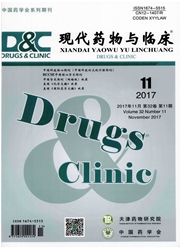

 中文摘要:
中文摘要:
目的探索木香烃内酯对白血病耐药细胞系K562/A02阿霉素耐药的逆转作用。方法将木香烃内酯与K562/A02细胞共培养72 h后,采用MTT法检测木香烃内酯对细胞生长的抑制作用。不同浓度木香烃内酯处理K562/A02细胞24 h后,采用Annexin V和PI双染法检测木香烃内酯对细胞的凋亡。不同浓度木香烃内酯与阿霉素共培养72 h后采用MTT法检测木香烃内酯对K562/A02细胞的耐药逆转情况。采用流式细胞仪检测木香烃内酯处理24 h之后K562/A02细胞阿霉素蓄积以及细胞膜表面P-糖蛋白(P-gp)的表达。结果木香烃内酯对K562/A02细胞的生长具有明显抑制作用,呈显著的剂量相关性。与对照组比较,2.5~50μmol/L木香烃内酯组K562/A02细胞存活率显著降低(P〈0.05、0.01、0.001)。随着木香烃内酯浓度的增加,凋亡细胞的比例明显增加。与对照组比较,不同浓度木香烃内酯组细胞凋亡比例显著升高(P〈0.05、0.01、0.001)。加入5μmol/L木香烃内酯后,使K562/A02细胞对阿霉素的敏感性提高12倍。木香烃内酯处理后K562/A02细胞内部阿霉素的蓄积明显增加,呈浓度相关性。与对照组比较,5、10μmol/L木香烃内酯组K562/A02细胞内部阿霉素的蓄积增加显著升高(P〈0.05)。细胞表面的P-gp的表达并无显著影响。结论木香烃内酯能够抑制K562/A02细胞增殖,诱导K562/A02细胞凋亡,增强阿霉素的化疗敏感性,逆转阿霉素耐药。
 英文摘要:
英文摘要:
Objective To investigate the reverse effect against adriamycin resistance of costunolide on leukemia drug resistant cell line K562/A02. Methods Costunolide and K562/A02 cells were co-cultured for 72 h, and inhibition of costunolide on K562/A02 cell were determined by MTT assay. K562/A02 cells were treated for 24 h by various concentrations of costunolide, and the apoptosis of K562/A02 cells were detected by Annexin V/PI apoptosis kit on flow cytometry. Various concentrations of costunolide and adriamycin were co-cultured with K562/A02 cells for 72 h, and the reversals were determined by MTT assay. Accumulation of adriamycin and the expression of P-glycoprotein(P-gp) were analyzed by flow cytometry after the treatment for 24 h of costunolide with various concentrations. Results Costunolide could significantly exhibit growth of K562/A02 cell in a dose dependent manner. Compared with the control group, survival rates of K562/A02 cell in the costunolide 2.5 — 50 μmol/L groups were significantly decreased(P〈 0.05, 0.01, 0.001). Apoptosis ratios of K562/A02 cells in the costunolide groups were significantly decreased with increase of concentrations of costunolide. Compared with the control group, apoptosis rates of K562/A02 cell in the costunolide groups were significantly increased(P〈 0.05, 0.01, 0.001). Intake of adriamycin in K562/A02 cell increased to 12 times after treated by 5 μmol/L costunolide. Accumulation of adriamycin in K562/A02 cell treated by costunolide were significantly increased in a concentration dependent manner. Compared with the control group, accumulation of adriamycin in K562/A02 cell in the 5 and 10 μmol/L costunolide groups were significantly increased(P〈 0.05). However, there was no significant difference of expressions of P-gp between two groups. Conclusion Costunolide can inhibit the proliferation of K562/A02 cells, induce apoptosis in K562/A02 cells, enhance chemotherapy sensitivity of doxorubicin, and reverse adriamycin resistance.
 同期刊论文项目
同期刊论文项目
 同项目期刊论文
同项目期刊论文
 期刊信息
期刊信息
